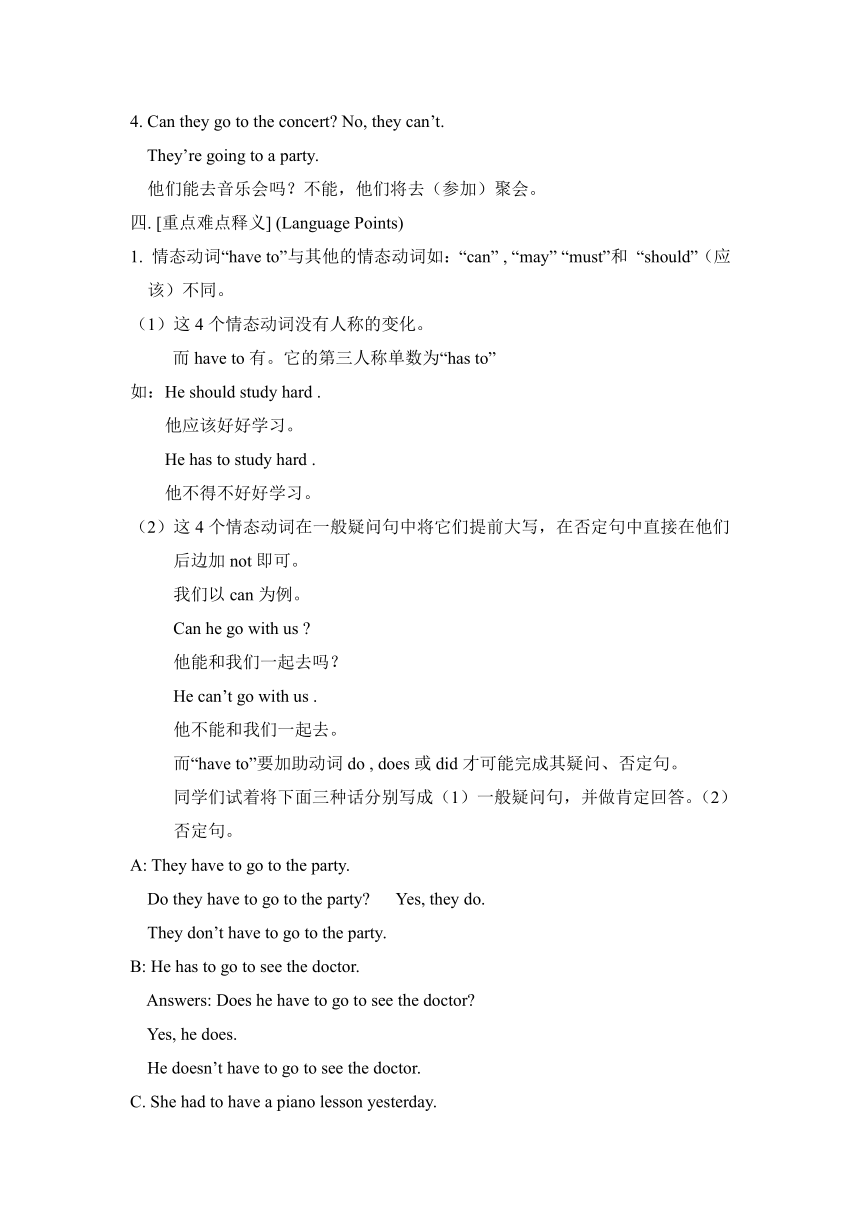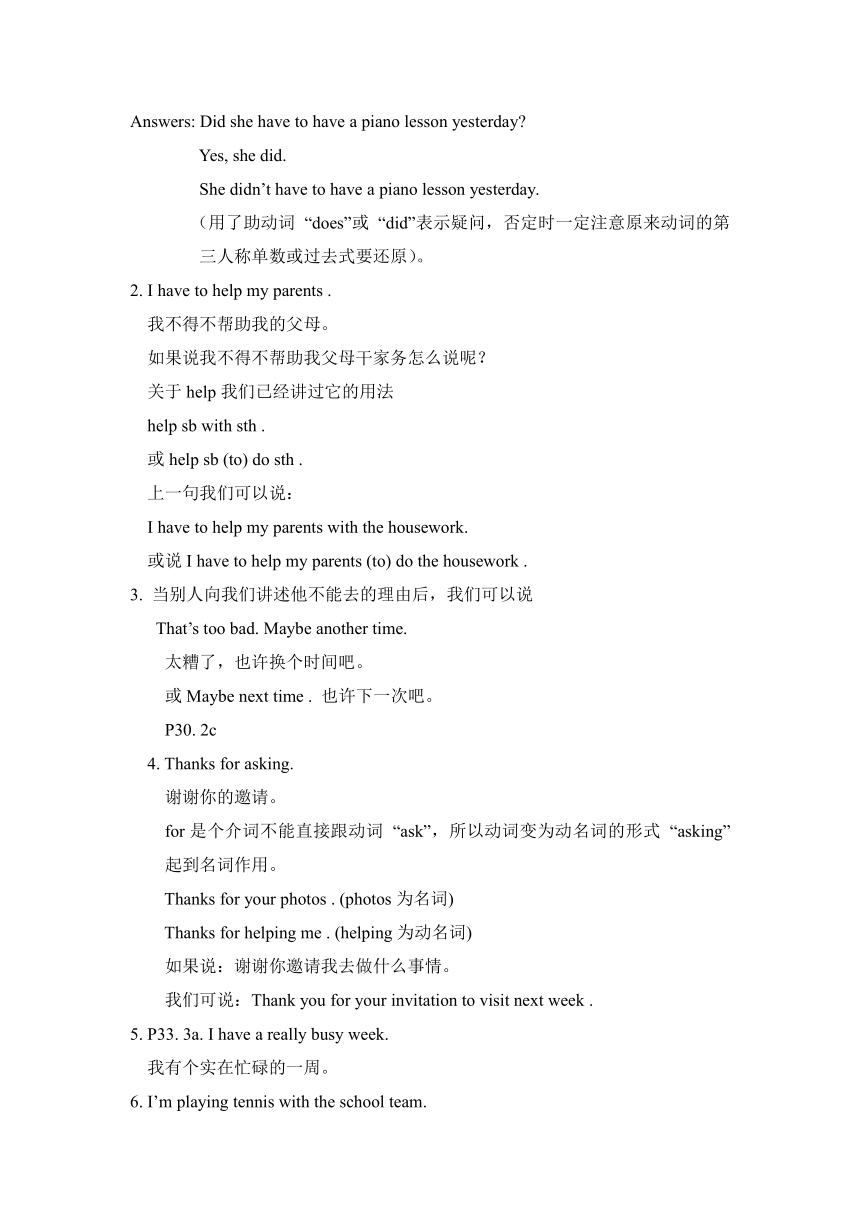七年级下英语|Unit 1 Can you come to my party?|知识总结
文档属性
| 名称 | 七年级下英语|Unit 1 Can you come to my party?|知识总结 |  | |
| 格式 | rar | ||
| 文件大小 | 8.4KB | ||
| 资源类型 | 教案 | ||
| 版本资源 | 鲁教版(五四学制) | ||
| 科目 | 英语 | ||
| 更新时间 | 2010-08-01 10:00:00 | ||
图片预览



文档简介
Unit 1 Can you come to my party
一. [话题](Topic) Invitations
二. [重点词组](Key Phrases)
1. Have a piano lesson
2. Have math
3. Have a test
4. Study for a test
5. What a small party!
6. On Saturday
7. Too bad!
8. Too many
9. Too old
10. I can’t either.
11. I can too.
12. Next time
13. Anther time
14. Thanks for asking
15. Say no to +N…
16. Say yes to + N…
17. Invite sb to do…=ask sb to do sth…
三. [交际用语]
1. Can you come to my party 你能来我的聚会吗?
Sure, I’d love to. 当然,我很愿意。
2. Can you go to the movies I’m sorry.
I have to help my mom.
你能去看电影吗?对不起,我必须帮我妈妈。
3. Can she go to the baseball game No, she can’t.
She has to study for a test.
她能去棒球赛吗?不能,她不得不为考试学习。
4. Can they go to the concert No, they can’t.
They’re going to a party.
他们能去音乐会吗?不能,他们将去(参加)聚会。
四. [重点难点释义] (Language Points)
1. 情态动词“have to”与其他的情态动词如:“can” , “may” “must”和 “should”(应该)不同。
(1)这4个情态动词没有人称的变化。
而have to有。它的第三人称单数为“has to”
如:He should study hard .
他应该好好学习。
He has to study hard .
他不得不好好学习。
(2)这4个情态动词在一般疑问句中将它们提前大写,在否定句中直接在他们后边加not即可。
我们以can为例。
Can he go with us
他能和我们一起去吗?
He can’t go with us .
他不能和我们一起去。
而“have to”要加助动词do , does或did才可能完成其疑问、否定句。
同学们试着将下面三种话分别写成(1)一般疑问句,并做肯定回答。(2)否定句。
A: They have to go to the party.
Do they have to go to the party Yes, they do.
They don’t have to go to the party.
B: He has to go to see the doctor.
Answers: Does he have to go to see the doctor
Yes, he does.
He doesn’t have to go to see the doctor.
C. She had to have a piano lesson yesterday.
Answers: Did she have to have a piano lesson yesterday
Yes, she did.
She didn’t have to have a piano lesson yesterday.
(用了助动词 “does”或 “did”表示疑问,否定时一定注意原来动词的第三人称单数或过去式要还原)。
2. I have to help my parents .
我不得不帮助我的父母。
如果说我不得不帮助我父母干家务怎么说呢?
关于help我们已经讲过它的用法
help sb with sth .
或help sb (to) do sth .
上一句我们可以说:
I have to help my parents with the housework.
或说I have to help my parents (to) do the housework .
3. 当别人向我们讲述他不能去的理由后,我们可以说
That’s too bad. Maybe another time.
太糟了,也许换个时间吧。
或Maybe next time . 也许下一次吧。
P30. 2c
4. Thanks for asking.
谢谢你的邀请。
for是个介词不能直接跟动词 “ask”,所以动词变为动名词的形式 “asking”起到名词作用。
Thanks for your photos . (photos为名词)
Thanks for helping me . (helping为动名词)
如果说:谢谢你邀请我去做什么事情。
我们可说:Thank you for your invitation to visit next week .
5. P33. 3a. I have a really busy week.
我有个实在忙碌的一周。
6. I’m playing tennis with the school team.
我将同校队打网球。
7. P34. finish the geography project in the evening .
意思是在晚上完成地理作业。
project有计划、工程、设计的意思。
8. The whole day
整个一天。
whole做“定语”如讲:the whole country . 整个国家
the whole world 整个世界等
9. come over to my house 到我家来
come over to表示从一个地方来到另一个地方。
come over还有“过来”“顺便来访”的意思
同学们根据五单元的内容及所学的重点句型翻译下列各句:
1. Mary能去棒球赛吗?
Can Mary go to the baseball game
2. 她必须照顾(bab ysit)她的妹妹。
She has to bab ysit her sister.
3. 我这周真的很忙。
I am really busy this week .
4. 非常感谢你的邀请(用a lot)
Thanks a lot for your invitation .
5. 我这周末作业太多。
I have too much homework this weekend .
6. 我后天去大型购物中心。
I am going to the mall the day after tomorrow .
7. 我不得不帮他打扫他的房间。
I have to help him (to) clean his room .
8. 我必须练习钢琴。
I have to practice the piano .
9. 你能和我一起去购物吗?
Can you go shopping with me
10. 当然我很愿意。
Sure . I’d love to .
五.语法知识
1. 在我们日常生活中经常会邀请同学或朋友一起和我们做什么,应该怎么说呢?
如: (1)你周三能来我的生日会吗?
Can you come to my birthday party on Wednesday
(2)你能和我一起打网球吗?
Can you play tennis with me
(3)你明天晚上能来我的家吗?(come over to)
Can you come over to my house tomorrow evening
(4)她后天能去听音乐会吗?
Can she go to the concert the day after tomorrow
(5)他们能去看电影吗?
Can they go to the movie
这些句子中“can”表示“可能性”。
(1)这些表示邀请的句子,我们都可以用情态动词can来表示“可能”“能够”。表示一种可能性。
(2)在此之前,我们还见过can表示“能力”“能、会”。
如: She can run fast, but I can’t.
她能跑得很快,而我不能。
(3)另外我们还学过can表示许可、允许。
如: We can listen to music in the music class.
我们能在音乐课上听音乐。
We can’t run in the hallways.
我们不能在走廊里跑。
2. 学会了如何邀请他人做某事,我们也应该知道如何对别人的邀请说愿意或表示拒绝,并学会如何讲清原因。
如: 当同学邀请你去看电影时,你非常愿意。
那么你就应该说:
Sure ! I’d love to .
或说:Sure ! I’d like to .
注意在这两种中“to”不能省掉,否则意思不完整,不能说:
I’d like或I’d love .
I’d love to 比I’d like to表达程度更深一些。
I’d = would
I’d love to = I would love to .
如果我们有事不能去,我们可以说:
非常感谢你的邀请,但很抱歉我不能去。
Thank you very much for your invitation.
或说:
Thanks for asking.
I’m sorry, I can’t.
接下来我们应该陈述理由。
如:
(1)我必须帮助我的妈妈。
I have to help my mom.
(2)我们将要踢足球去。
We are playing soccer.
(3)他不得不为数学考试学习。
He has to study for the math test.
(4)我有一节钢琴课。
I am having a piano lesson.
(5)我这个周末的作业太多。
I have too much homework this weekend .
(6)我要去堂兄的生日会。
I’m going to my cousin’s birthday party .
可以用“have to”表示客观上的“必须”“不得不”,也可以用现在进行时表示计划好的将来要做的事情。
He doesn’t have to go to see the doctor.
C. She had to have a piano lesson yesterday.
Answers: Did she have to have a piano lesson yesterday
Yes, she did.
She didn’t have to have a piano lesson yesterday.
(用了助动词 “does”或 “did”表示疑问,否定时一定注意原来动词的第三人称单数或过去式要还原)。
2. I have to help my parents .
我不得不帮助我的父母。
如果说我不得不帮助我父母干家务怎么说呢?
关于help我们已经讲过它的用法
help sb with sth .
或help sb (to) do sth .
上一句我们可以说:
I have to help my parents with the housework .
或说I have to help my parents (to) do the housework .
一. [话题](Topic) Invitations
二. [重点词组](Key Phrases)
1. Have a piano lesson
2. Have math
3. Have a test
4. Study for a test
5. What a small party!
6. On Saturday
7. Too bad!
8. Too many
9. Too old
10. I can’t either.
11. I can too.
12. Next time
13. Anther time
14. Thanks for asking
15. Say no to +N…
16. Say yes to + N…
17. Invite sb to do…=ask sb to do sth…
三. [交际用语]
1. Can you come to my party 你能来我的聚会吗?
Sure, I’d love to. 当然,我很愿意。
2. Can you go to the movies I’m sorry.
I have to help my mom.
你能去看电影吗?对不起,我必须帮我妈妈。
3. Can she go to the baseball game No, she can’t.
She has to study for a test.
她能去棒球赛吗?不能,她不得不为考试学习。
4. Can they go to the concert No, they can’t.
They’re going to a party.
他们能去音乐会吗?不能,他们将去(参加)聚会。
四. [重点难点释义] (Language Points)
1. 情态动词“have to”与其他的情态动词如:“can” , “may” “must”和 “should”(应该)不同。
(1)这4个情态动词没有人称的变化。
而have to有。它的第三人称单数为“has to”
如:He should study hard .
他应该好好学习。
He has to study hard .
他不得不好好学习。
(2)这4个情态动词在一般疑问句中将它们提前大写,在否定句中直接在他们后边加not即可。
我们以can为例。
Can he go with us
他能和我们一起去吗?
He can’t go with us .
他不能和我们一起去。
而“have to”要加助动词do , does或did才可能完成其疑问、否定句。
同学们试着将下面三种话分别写成(1)一般疑问句,并做肯定回答。(2)否定句。
A: They have to go to the party.
Do they have to go to the party Yes, they do.
They don’t have to go to the party.
B: He has to go to see the doctor.
Answers: Does he have to go to see the doctor
Yes, he does.
He doesn’t have to go to see the doctor.
C. She had to have a piano lesson yesterday.
Answers: Did she have to have a piano lesson yesterday
Yes, she did.
She didn’t have to have a piano lesson yesterday.
(用了助动词 “does”或 “did”表示疑问,否定时一定注意原来动词的第三人称单数或过去式要还原)。
2. I have to help my parents .
我不得不帮助我的父母。
如果说我不得不帮助我父母干家务怎么说呢?
关于help我们已经讲过它的用法
help sb with sth .
或help sb (to) do sth .
上一句我们可以说:
I have to help my parents with the housework.
或说I have to help my parents (to) do the housework .
3. 当别人向我们讲述他不能去的理由后,我们可以说
That’s too bad. Maybe another time.
太糟了,也许换个时间吧。
或Maybe next time . 也许下一次吧。
P30. 2c
4. Thanks for asking.
谢谢你的邀请。
for是个介词不能直接跟动词 “ask”,所以动词变为动名词的形式 “asking”起到名词作用。
Thanks for your photos . (photos为名词)
Thanks for helping me . (helping为动名词)
如果说:谢谢你邀请我去做什么事情。
我们可说:Thank you for your invitation to visit next week .
5. P33. 3a. I have a really busy week.
我有个实在忙碌的一周。
6. I’m playing tennis with the school team.
我将同校队打网球。
7. P34. finish the geography project in the evening .
意思是在晚上完成地理作业。
project有计划、工程、设计的意思。
8. The whole day
整个一天。
whole做“定语”如讲:the whole country . 整个国家
the whole world 整个世界等
9. come over to my house 到我家来
come over to表示从一个地方来到另一个地方。
come over还有“过来”“顺便来访”的意思
同学们根据五单元的内容及所学的重点句型翻译下列各句:
1. Mary能去棒球赛吗?
Can Mary go to the baseball game
2. 她必须照顾(bab ysit)她的妹妹。
She has to bab ysit her sister.
3. 我这周真的很忙。
I am really busy this week .
4. 非常感谢你的邀请(用a lot)
Thanks a lot for your invitation .
5. 我这周末作业太多。
I have too much homework this weekend .
6. 我后天去大型购物中心。
I am going to the mall the day after tomorrow .
7. 我不得不帮他打扫他的房间。
I have to help him (to) clean his room .
8. 我必须练习钢琴。
I have to practice the piano .
9. 你能和我一起去购物吗?
Can you go shopping with me
10. 当然我很愿意。
Sure . I’d love to .
五.语法知识
1. 在我们日常生活中经常会邀请同学或朋友一起和我们做什么,应该怎么说呢?
如: (1)你周三能来我的生日会吗?
Can you come to my birthday party on Wednesday
(2)你能和我一起打网球吗?
Can you play tennis with me
(3)你明天晚上能来我的家吗?(come over to)
Can you come over to my house tomorrow evening
(4)她后天能去听音乐会吗?
Can she go to the concert the day after tomorrow
(5)他们能去看电影吗?
Can they go to the movie
这些句子中“can”表示“可能性”。
(1)这些表示邀请的句子,我们都可以用情态动词can来表示“可能”“能够”。表示一种可能性。
(2)在此之前,我们还见过can表示“能力”“能、会”。
如: She can run fast, but I can’t.
她能跑得很快,而我不能。
(3)另外我们还学过can表示许可、允许。
如: We can listen to music in the music class.
我们能在音乐课上听音乐。
We can’t run in the hallways.
我们不能在走廊里跑。
2. 学会了如何邀请他人做某事,我们也应该知道如何对别人的邀请说愿意或表示拒绝,并学会如何讲清原因。
如: 当同学邀请你去看电影时,你非常愿意。
那么你就应该说:
Sure ! I’d love to .
或说:Sure ! I’d like to .
注意在这两种中“to”不能省掉,否则意思不完整,不能说:
I’d like或I’d love .
I’d love to 比I’d like to表达程度更深一些。
I’d = would
I’d love to = I would love to .
如果我们有事不能去,我们可以说:
非常感谢你的邀请,但很抱歉我不能去。
Thank you very much for your invitation.
或说:
Thanks for asking.
I’m sorry, I can’t.
接下来我们应该陈述理由。
如:
(1)我必须帮助我的妈妈。
I have to help my mom.
(2)我们将要踢足球去。
We are playing soccer.
(3)他不得不为数学考试学习。
He has to study for the math test.
(4)我有一节钢琴课。
I am having a piano lesson.
(5)我这个周末的作业太多。
I have too much homework this weekend .
(6)我要去堂兄的生日会。
I’m going to my cousin’s birthday party .
可以用“have to”表示客观上的“必须”“不得不”,也可以用现在进行时表示计划好的将来要做的事情。
He doesn’t have to go to see the doctor.
C. She had to have a piano lesson yesterday.
Answers: Did she have to have a piano lesson yesterday
Yes, she did.
She didn’t have to have a piano lesson yesterday.
(用了助动词 “does”或 “did”表示疑问,否定时一定注意原来动词的第三人称单数或过去式要还原)。
2. I have to help my parents .
我不得不帮助我的父母。
如果说我不得不帮助我父母干家务怎么说呢?
关于help我们已经讲过它的用法
help sb with sth .
或help sb (to) do sth .
上一句我们可以说:
I have to help my parents with the housework .
或说I have to help my parents (to) do the housework .
同课章节目录
- Unit 1 Do you want to watch a game show?
- Section A
- Section B
- Unit 2 I'm going to study computer science.
- Section A
- Section B
- Unit 3 Will people have robots?
- Section A
- Section B
- Unit 4 How do you make a banana milk shake?
- Section A
- Section B
- Unit 5 Can you come to my party?
- Section A
- Section B
- Unit 6 If you go to the party, you'll have a great
- Section A
- Section B
- Unit 7 What's the matter?
- Section A
- Section B
- Unit 8 I'll help to clean up the city parks.
- Section A
- Section B
